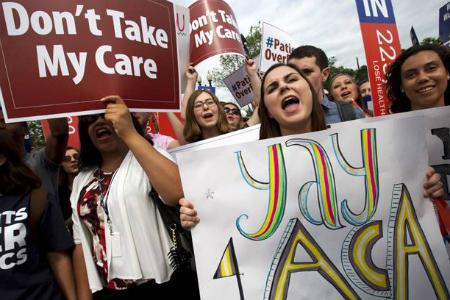Will Repealing Obamacare Bring Job Lock?
Published: Jan 26, 2017

One of the underreported purposes, and results, of the Affordable Care Act (ACA) is that it freed many Americans from “job lock”—the inability or unwillingness of an employee to leave a job because doing so will result in the loss of their health care. And freeing people from job lock is good for individual employees, good for businesses, good for entrepreneurship, and good for the economy. With the GOP fully in control of Congress and the White House, the ACA is on its deathbed. On the first day of his presidency, Donald Trump signed an executive order aimed at the repeal of the ACA—though the order itself will have little, if any practical effect. House Speaker Paul Ryan has said that he hopes to repeal the law by March or April of this year. Though the Republicans have vowed to replace the ACA with an improved health care law, they have so far not offered any comprehensive replacement plan in the nearly seven years since the ACA passed into law in 2010.
Among developed nations, health care-related job lock is a problem unique to the United States as the U.S. is the only developed country without universal health care coverage. The problem arises when a worker receives their health care insurance through an employer-sponsored plan. An employee who has such coverage is less likely to leave a job if they are unable to get substantially similar coverage elsewhere. So an employee will be less likely to leave a job with health care insurance to start their own business, or take a job that does not offer health care, or to take a job with health care that does not cover some pre-existing conditions. A Harvard Business School study in 2008 estimated that 11 million workers were in jobs that they did not want, solely to keep their health coverage. A 2015 study found that locked-in workers had higher rates of depression and stress, lower self-reported life satisfaction, and poorer mental health. Job lock results in lower job mobility, a misallocation of workers, and a loss of innovation, all negative impacts to the nation’s economy as a whole.
The implementation of the ACA has lowered job lock in a number of ways. One of the law’s most popular features is the ability of those under age 26 to stay on their parents’ health insurance. One effect of this provision is it allows young people to start their own businesses rather than take jobs offering health care. One study found that 19 to 25 year olds were two to three times more likely to go into business for themselves after the implementation of the ACA than they were before. And studies of similar state-based laws also showed an increase in education, as young people were able to go to college or grad school rather than finding a job just to get health coverage.
Another way in which the ACA targeted job lock is in requiring non-discriminatory coverage of pre-existing conditions, something not often found in open market and many employer-sponsored health insurance plans before the ACA. Millions of people have pre-existing conditions that made leaving a job untenable because they would not be able to immediately get coverage for their pre-existing condition at an affordable cost. In the first quarter of 2016 people voluntarily working part time was up 10% from the first quarter of 2013, before the health care exchanges were in place. In that same period, the number of people working part time because they couldn’t find full time jobs dropped by 24%. In other words, more people are choosing to work part time and fewer people are stuck working part time since the implementation of the open market health care exchanges.
So with the GOP-controlled government’s pending repeal of the ACA, what will happen to job lock? It’s hard to say, since there is no replacement option on the table. Trump has claimed that any replacement will keep the law’s popular prohibition against discriminating against people with pre-existing conditions by denying them coverage for charging them more. He’s also said that he’d like the replacement to keep the ACA’s provision allowing those under 26 years old to stay on their parents’ insurance plans. It’s impossible to know whether these provisions will be in whatever replacement plan the GOP eventually comes up with. It’s hard to imagine keeping these popular aspects without the less popular “mandate” that Republicans have railed against because the mandate is what actually pays for the popular provisions.
In 2009, Ryan said that “the key question that ought to be addressed in any health care reform legislation is, are we going to continue job lock, or are we going to allow individuals more choice and portability to fit the 21st century workforce?” That is a key question indeed, and it’s now Ryan’s and Trump’s time to answer it.
